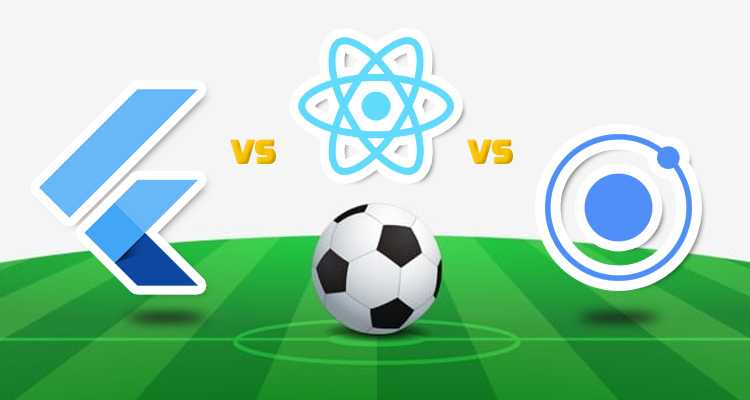Hybrid App Development: Flutter vs React vs Ionic
I am a techie with more than five years of experience in app development, working extensively on native Android development. Recently, I have enjoyed spending the last few years working on hybrid apps, as I’m always trying to stay on top of technology as the IT industry evolves every 8-10 months.
In this blog post, I will take a look at different hybrid app platforms and compare and review them to determine which I think is best.

What is a hybrid app?
Hybrid apps simplify app development by allowing a single code base to be used for both iOS and Android mobile platforms. Ionic and Flutter are the primary enablers of hybrid app production, which we can also use for web development. Hybrid apps open up a whole new world of cost-efficiency as they eliminate the need to employ both iOS and Android specialists.
Ionic:
Ionic was created in 2013. All the experts say that this platform is the most efficient and most easy for Mobile app development. This platform is using technologies that are HTML, SCSS, Javascript, Angular. Nowadays you can use react or vue.
Ionic, created in 2013, is the favorite of many experts and developers due to its efficiency and ease of use. It’s built on HTML, CSS, JavaScript, and Angular but it’s also compatible with React and Vue.
| Pros | Cons |
|---|---|
| Quick development period | Can cause problems with iOS code output |
| Single codebase | Not the best suited for UI design work |
| Cheap maintenance | Inferior security |
| Easy to learn | Version-wise code changes |
| Good plugin compatibility | Dependent on plugins |
| Large community | No hot reloading |
| Supports web builds |
Ionic’s use is declining; 28% of hybrid developers used it in 2019 but only 18% used it in 2020.
React :
Both the React Js and React native platforms are developed by Facebook. Released in 2015 for mobile cross-platform app development, react native is built on JavaScript. I think it’s currently the best platform for mobile app development.
| Pros | Cons |
|---|---|
| Best UI development | Long opening time |
| Reusable code for different OS | Security issues |
| Hot reloading supported | Difficult learning curve |
| Less time-consuming | Not the maturest platform |
| Large community | |
| Third-party library supported | |
| Frequent updates |
React’s use is stable; 42% of hybrid developers used it in 2019, 42% used it in 2020.
Flutter:
Flutter is cross-platform, open-source, and was developed by Google starting in 2017. The platform uses Dart, a new object-oriented programming language. It is very easy to learn compared to the other options.
| Pros | Cons |
|---|---|
| UI looks similar to old Android and iOS devices | Resource-intensive |
| Single codebase | iOS issues |
| Less testing needed | No third-party library |
| Superior performance | Lack of community |
| Supports Android, iOS, web, and Google Fuchsia. |
Flutter’s use is increasing; 30% of hybrid developers used it in 2019, 39% used it in 2020.
| React | Ionic | Flutter | |
|---|---|---|---|
| Founders and year | Facebook, 2015 | Drifty, 2013 | Google, 2017 |
| Community | Large | Large | Small |
| Open-source | Yes | Absolutely Yes, paid also | Yes |
| Supported platform | Android and iOS | Pure Android, iOS, and web | Android, iOS, Web, Fuchsia |
| Frontend support | Native component | Html, CSS, and Ionic design component | Attractive UI with widgets |
| Performance | Faster native experience | Fast interactive experience | High graphical performance |
| Used By | Facebook, Instagram, Tesla | Honefy, Justwatch, Automotive, MarketWatch | Google Ads, Alibaba, Hamilton Musical |
Conclusion:
This concludes my roundup of the best hybrid development platforms. If you want to take the easy route then choose Flutter or Ionic, which have the gentlest learning curves and also support web development and progressive web apps. My personal favorite is Flutter but let us know what works for you.





















Comments